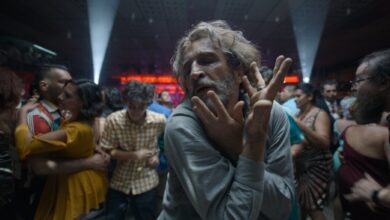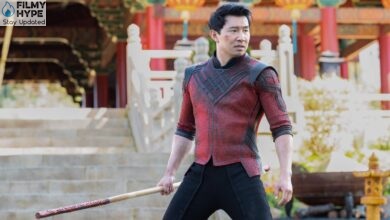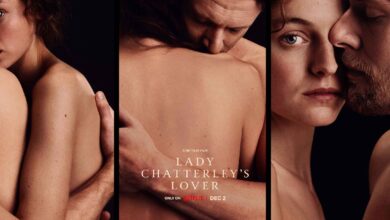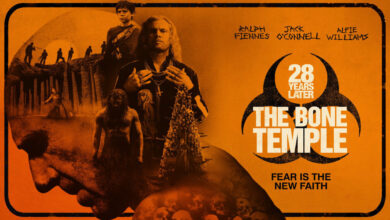The Strays Review: Tries To Place Itself In The Wake Of Social Thrillers | Netflix Film
Cast: Ashley Madekwe, Samuel Paul Small, Maria Almeida, Bukky Bakray and Jorden Myrie
Director: Nathaniel Martello-White
Streaming Platform: Netflix
Filmyhype.com Ratings: 3/5 (three stars)
The Strays, a lost person, a Netflix movie 1 hour 37 minutes, a perfect life… A perfect lie… The life of an upper-middle-class woman begins to reveal the truth. With the arrival of two young blacks in her town. The social denunciation of horror thriller is a sub-genre of horror cinema that has always enjoyed great success, both with audiences and with critics. The most illustrious and recent examples are the works of Jordan Peele: Get Out, Nope, and the more recent Nope. These three films explore how African Americans are still victims of various forms of racism, even by the more liberal sections of US society. As we will see in this review of The Strays, Nathaniel Martello-White’s film follows in the footsteps traced by Peele (moving from the USA to England), however seeking its originality.

The result, in our opinion, lacks the acumen of the previously mentioned works, and is confused and off-center; In fact, The Strays fails to draw the public’s attention to the issues it seeks to denounce, getting lost in an approximate development and a final with little impact. British Netflix drama thriller produced by black actor Nathaniel Martello-White who turned to direct and write the first story with the moody tone of the mysterious black people genre It makes me think that this actor may have been inspired by Jordan Peele. The famous director from Get Out also comes from the same actors. and came to take good care of the directing, writing a script telling the story of his movie in the area of a thriller that still has a lot to tell.
The Strays Review: The Story Plot
The protagonist of this story is Cheryl (Ashley Madekwe), a black woman dissatisfied with her life who decides – as we see in the prologue – to leave everything and everyone to start over. We find her again about twenty years later, mother of a family – who calls herself Snow – in an upper-class suburb, at the center of the social life of a community where they are all white and rich. If her everyday life is perfect – between breakfasts with friends, the job of vice principal of a prestigious private college, and the organization of a charity gala – the memory of what she has abandoned seems to resurface disturbingly. When an unknown black man and girl arrive in the neighborhood, approaching both of his children – Sebastian (Samuel Paul Small) and Mary (Maria Almeida) – things start to go downhill for Neve, amidst disturbing visions that seem to endanger even his sanity.
The plot is divided into 4 chapters, alternating from the corners of the main characters. Starting with Nef (actress Ashley Madekwe), a black mother who has changed herself to look like a white person who has a good job position. She began to see two black men and women hanging out in a town near her family. In this city, only she was black before. The film presents that she begins to suffer from various symptoms of itchy head scratching Easy loss of consciousness leaving a lot of suspicions to the audience all the time The film tells the first half hour of Neff’s chapter. before revealing the important secrets of the story and then cutting to Chapter 2. It’s another corner of the story of two black brothers that Neff saw. And the audience will see another side of the story in the first chapter. What did Neff see, and think was the truth? Before cutting back to the story of Neff again by telling the whole story for us to understand and reveals Neff’s true identity Which is why the culmination of the story is a quiet, terrifying house-thriller with no loud, no gore. But it gives a thrilling feeling that something bad will come.
The Strays Review and Analysis
As we anticipated at the beginning, if we take the thrillers/horrors of Peele’s brilliant filmography as a term of comparison, Martello-White’s work is decidedly less focused. What the author would like to communicate to us is – initially – very clear, but then the effectiveness of his message is diluted and ends up being definitively lost in the concluding sequence. At the center of the film, we find a woman who tries to erase her identity as a black woman, building a life for herself in an all-white community in which she is accepted. However, the digs about her skin color and being different from her are continuous (“you’re practically one of us”, a friend tells her at one point), and seem to be the trigger for the chaos that slowly breaks into life her. A particularly apt image, in our opinion, is the one evoked by the relationship between Neve and her hair: in fact, the woman hides her natural hair with a series of wigs, which, however, begin to cause itching and discomfort.
As if her identity as a black woman, and with her, the past she is trying to bury, was trying to come back to the surface starting from this very part of her body which is so fundamental to a person’s identity. The arrival of the two “intruders” (Bukky Bakray and Jorden Myrie) “ruined” a message that seemed so neatly prepared for the viewer; as the narrative unfolds, what the film would like to communicate loses strength. Above all, the enofng shifts the focus from social criticism to the protagonist’s reality. In the closing sequence whether Cheryl/Neve had been Black, Caucasian, Asian or Latina would have made no difference. The work therefore involuntarily erases her identity, going from being a film of denunciation to any thriller.
Focusing specifically on the ending, therefore, we can only notice how the attempt to make it shocking – which is partially achieved – ends up transforming it into something decidedly more incisive than what it could have been, shifting, as we said, the focus of the story from universal (from the condition of black victims of discrimination) to personal (a woman who out of sheer selfishness is ready for anything). Even the moments of mental confusion of the protagonist – the disturbing visions that briefly haunt her – from the point of view of the ending completely lose their meaning and usefulness, making everything even less convincing.
It’s a shame, because the protagonists – especially Ashley Madekwe and the young Samuel Paul Small and Maria Almeida, who play his two children Sebastian and Maria – impressed us with the validity of their interpretations. Above all, Madekwe gives life to a deeply ambiguous character, capable of passing from fierce maternal love to boundless selfishness, truly surprising the viewer. Perhaps less successful are the two “outsiders” of this story, Bukky Bakray and Jorden Myrie in the role of Abigail and Marvin: these two characters are at times unjustifiably over the top, exaggeratedly crazy without being given a real explanation (if not vague hints of a traumatic past) about why they act the way they do.
It is considered a movie that many things have done quite well, including the plot, the script, and the way of telling the story. Solve the problem of blacks and whites with actors who play well. light thriller scenes gradation to heavy More pressure than a straightforward horror scene. But came back to fall off the horse to die, causing the ending to be broken for the whole story until quite disappointing but it is still interesting in the direction of the work of a new black director who seems to try to follow in the footsteps of Jordan Peele.
The Strays Review: The Last Words
The Strays tries to place itself in the wake of social thrillers, a sub-genre that has enjoyed great success in recent years. It is a pity that the message it wants to communicate is not so incisive it does not strike the viewer as hoped. It is considered a movie that many things have done quite well, including the plot, the script, and the way of telling the story. Solve the problem of blacks and whites with actors who play well. light thriller scenes gradation to heavy More pressure than a straightforward horror scene. But came back to fall off the horse to die, causing the ending to be broken for the whole story until quite disappointing But it is still interesting in the direction of the work of a new black director who seems to try to follow in the footsteps of Jordan Peele.







